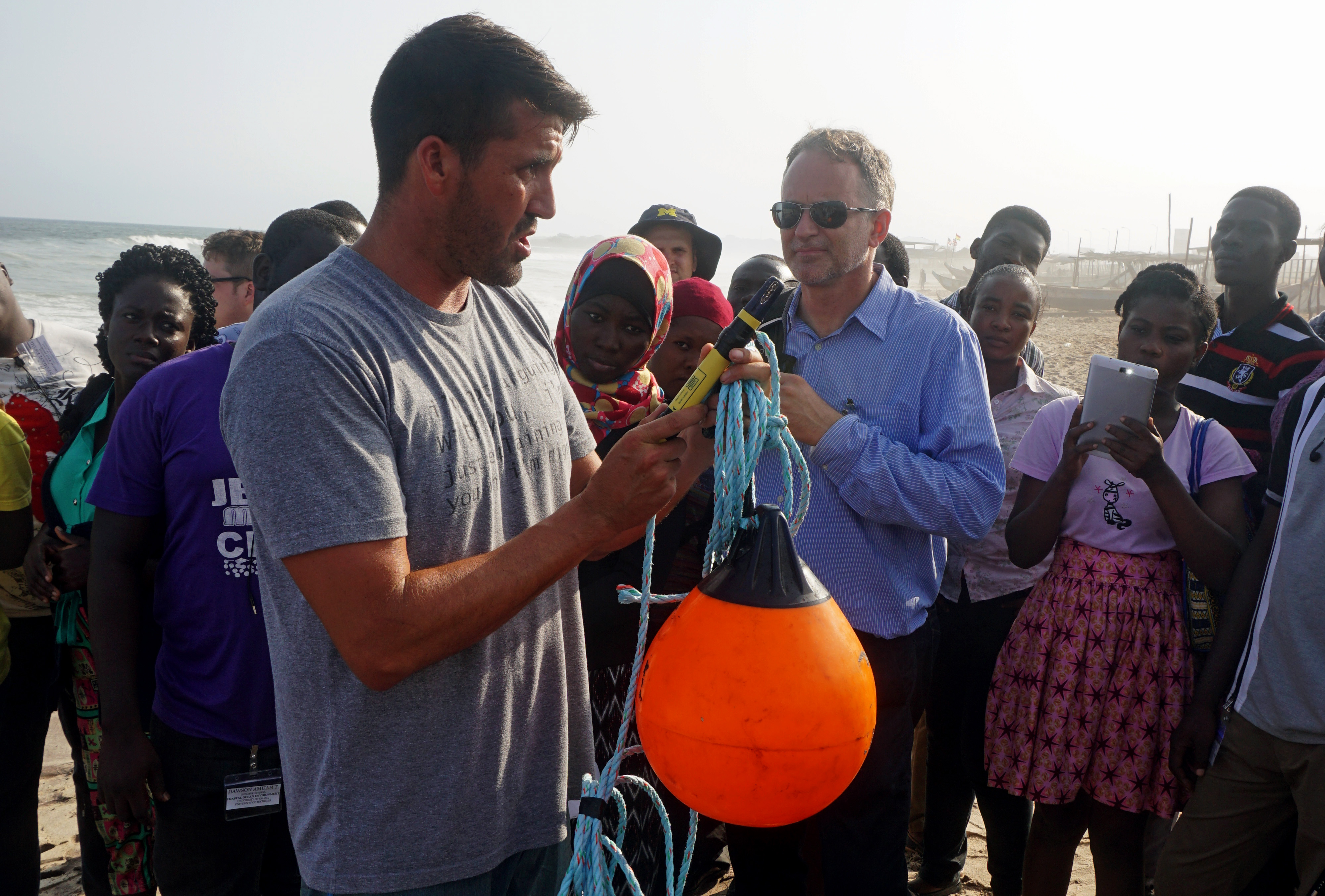

BACKGROUND AND HISTORY:
The Coastal Ocean Environment Summer School In Nigeria and Ghana began with an exploratory “scouting trip” made in August 2014 by Professor Brian K. Arbic and Research Scientist Dr. Joseph Ansong of the University of Michigan to the University of Ghana (UG), Regional Maritime University (RMU), the Department of Fisheries and Aquatic Sciences in the University of Cape Coast (UCC), and several departments at the Kwame Nkrumah University of Science and Technology (KNUST). Together with our Ghanaian and Nigerian colleagues, we have held summer schools every year since 2015.
In-person schools have been held in Ghana from 2015-2019, and in 2023. In 2022, an in-person school was held in Nigeria. We have held online schools every year since 2020. Moving forward we plan to run online schools every year and alternate in-person schools between Ghana and Nigeria.
Arbic was a US Peace Corps Volunteer Secondary Math and Physics Teacher at Damongo Secondary School from 1990-1992. Ansong was a student in Arbic’s Damongo classroom and worked as a postdoc in Arbic’s lab at University of Michigan from 2011-2017. Ansong returned to Ghana, as a faculty member in the UG Department of Mathematics, in 2017. Some background on Arbic and Ansong’s time together in Ghana in the 1990s and 2010s can be found here. Another participating US professor, Emily Shroyer of Oregon State University, was also a Peace Corps Volunteer Teacher in Ghana (Half Assini Secondary School, 2001-2003).
FUNDING:
Many thanks to our funders! These include: [logos will be added soon!]. See webpages for specific years for more details, including grant numbers.
We also wish to acknowledge several instructors who used some of their own individual funding to travel to the school.
COASTAL OCEAN ENVIRONMENT SUMMER SCHOOL IN THE PRESS:
Ghana News Agency, August 2, 2016
Koowa Media, August 2016
News Ghana, August 2016
2016 Ocean Sciences Meeting, Poster presentation, February 2016
2018 Ocean Sciences Meeting, Oral presentation slides, February 2018
Independent Newspapers, August 2022
UNILAG Media, August 2022
NNN News Nigeria, August 2022
PARTICIPANT INITIATIVES
Plastic Punch – started by Richmond Kennedy Quarcoo (COESSING participant 2015-2019): an international team of dedicated professionals aimed at protecting the environment from plastic waste, providing better waste management solutions, while improving people’s living conditions. Plastic Punch is a non profit organization launched in January 2018 in Accra, Ghana.
- Website: http://plasticpunch.org
- Twitter: @PlasticPunchGH
- Facebook: https://www.facebook.com/plasticpunch/
- Instagram: @plastic_punch
SELECT COESSING SUCCESSES
- Senam Tsai, a co-organizer of the 2017 summer school, is now a graduate student studying with Stephan Howden at University of Southern Mississippi.
-
Patrick Dwomfuor, a graduate student at the University of Ghana, is conducting PhD studies with COESSING instructors Joseph Ansong, Dimitris Menemenlis, and Brian Arbic. Patrick traveled to the 2018 PORSEC and 2019 ECCO summer school meetings.
-
Jennifer Moskel wrote an MS thesis (link to thesis) at Oregon State University on the impacts of our summer school on participants from the US, Europe, and Africa.
- The Python workshops that have been held at COESSING since 2018, have been a large success, introducing participants to the basics of Python computing. Several participants have used their Python knowledge to further their careers.
- Several past participants have returned to help run the school, including Oladipo Mumin and Daniel Quaye who were Python instructors in 2022, Richmond Kennedy Quarcoo as an instructor and organizer from 2019-2022, and Roland Ovbiebo as an organizer of the lightning talks in 2022.
CREDITS FOR WEBSITE, PHOTOS, AND LOGO:
The coessing.org website was created by Anne Canavati, a University of Michigan student research assistant who participated in the 2016 summer school. Paige Martin has been an instructor and maintained the website for the summer schools since 2017.
The flyer at the top of this page was designed by Jane Candy and Fawwaz Hafizh as part of their internship with the The Consortium for Ocean Leadership, while undergraduates at the University of Chicago.
Photos from the 2022 school were taken by Greg Wagner, Tashiana Osborne, Lois Anderson, and numerous participants. Photos from the 2019 school were taken by Paige Martin, RMU Photographer John Ayensu, and Jackie Wrage. During the 2018 school, photos were taken primarily by instructors Paige Martin, Nefertiti Smith, Christian Buckingham, Stephen Howden, and Dimitris Menemenlis, as well as Nigerian participant Darasimi Ogunsola. Photos from the 2017 school were taken primarily by Robert (Nick) King from CRDF Global, RMU Photographer John Ayensu, and several instructors, including Paige Martin and Dimitris Menemenlis. Most of the photos of the 2016 school were taken by Anne Canavati, University of Michigan student Elizabeth Oliphant, and instructor Drew Lucas. Most of the 2015 photos were taken by the RMU photographer John Ayensu and by instructor Winn Johnson. The summer school logo that we used from 2016-2022 was designed by University of Michigan student and 2016 COESSING participant Jessica Hicks. Our logo as of 2023 was designed by Bosede Lydia Ogunwuyi (LinkedIn, Instagram), a student of Federal University Oye-Ekiti and a 2022 COESSING participant.
